Tort Law: Duty of Care towards Prisoners and Employees in Concentrated Animal Feeding Operation (CAFO)
VerifiedAdded on 2023/06/03
|7
|1654
|104
AI Summary
This article discusses the duty of care of prisons and Concentrated Animal Feeding Operation (CAFO) towards prisoners and employees respectively. It examines the negligence of CAFO in providing a healthy environment to employees and the breach of duty by the prison authorities in losing medical reports of prisoners. It also discusses the mental injuries caused to employees due to brutal killing and abuse of animals in CAFO.
Contribute Materials
Your contribution can guide someone’s learning journey. Share your
documents today.
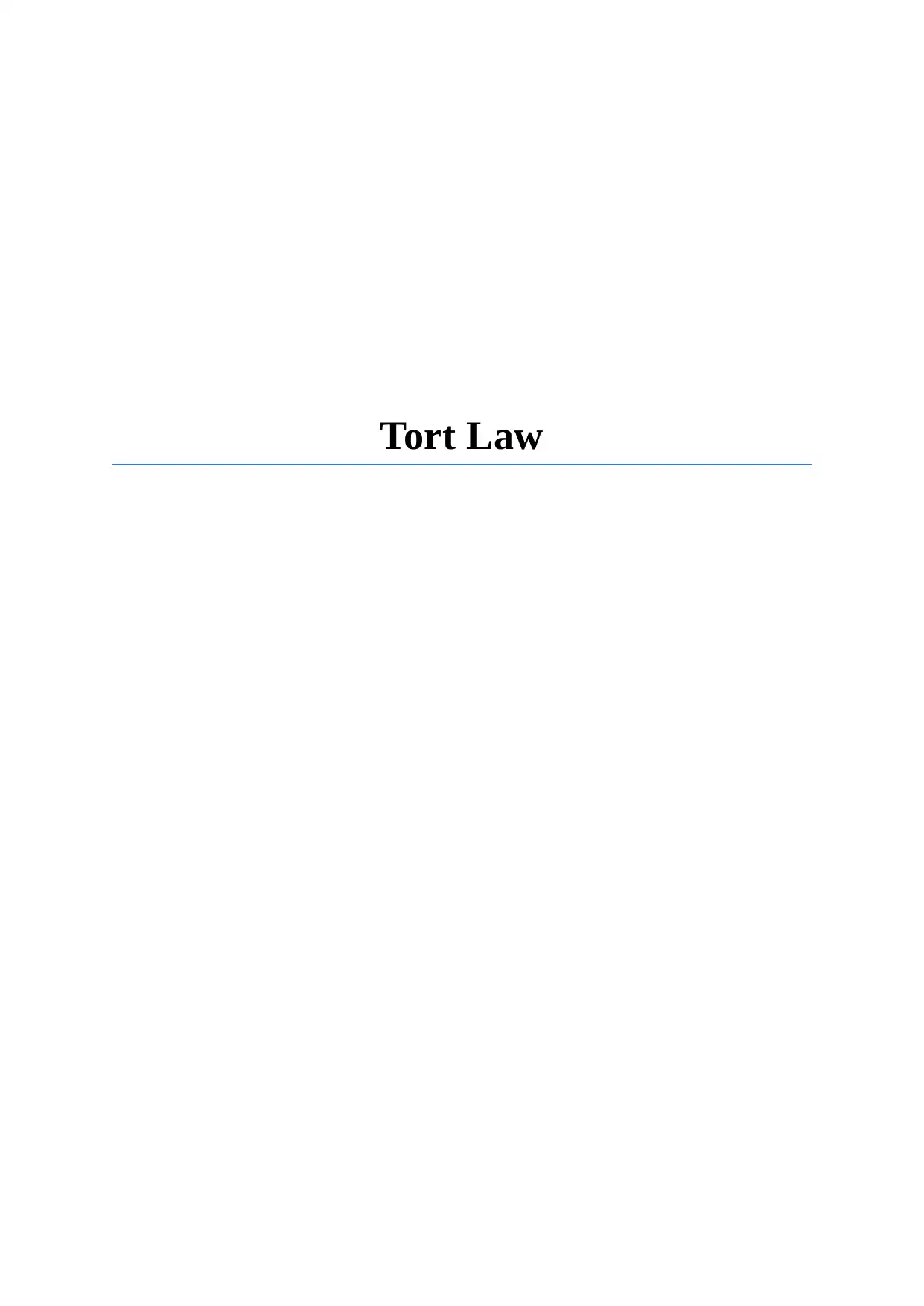
Tort Law
Secure Best Marks with AI Grader
Need help grading? Try our AI Grader for instant feedback on your assignments.

Table of Contents
Issue #1.......................................................................................................................................2
Issue #2.......................................................................................................................................3
Issue #3.......................................................................................................................................5
References..................................................................................................................................6
Issue #1.......................................................................................................................................2
Issue #2.......................................................................................................................................3
Issue #3.......................................................................................................................................5
References..................................................................................................................................6
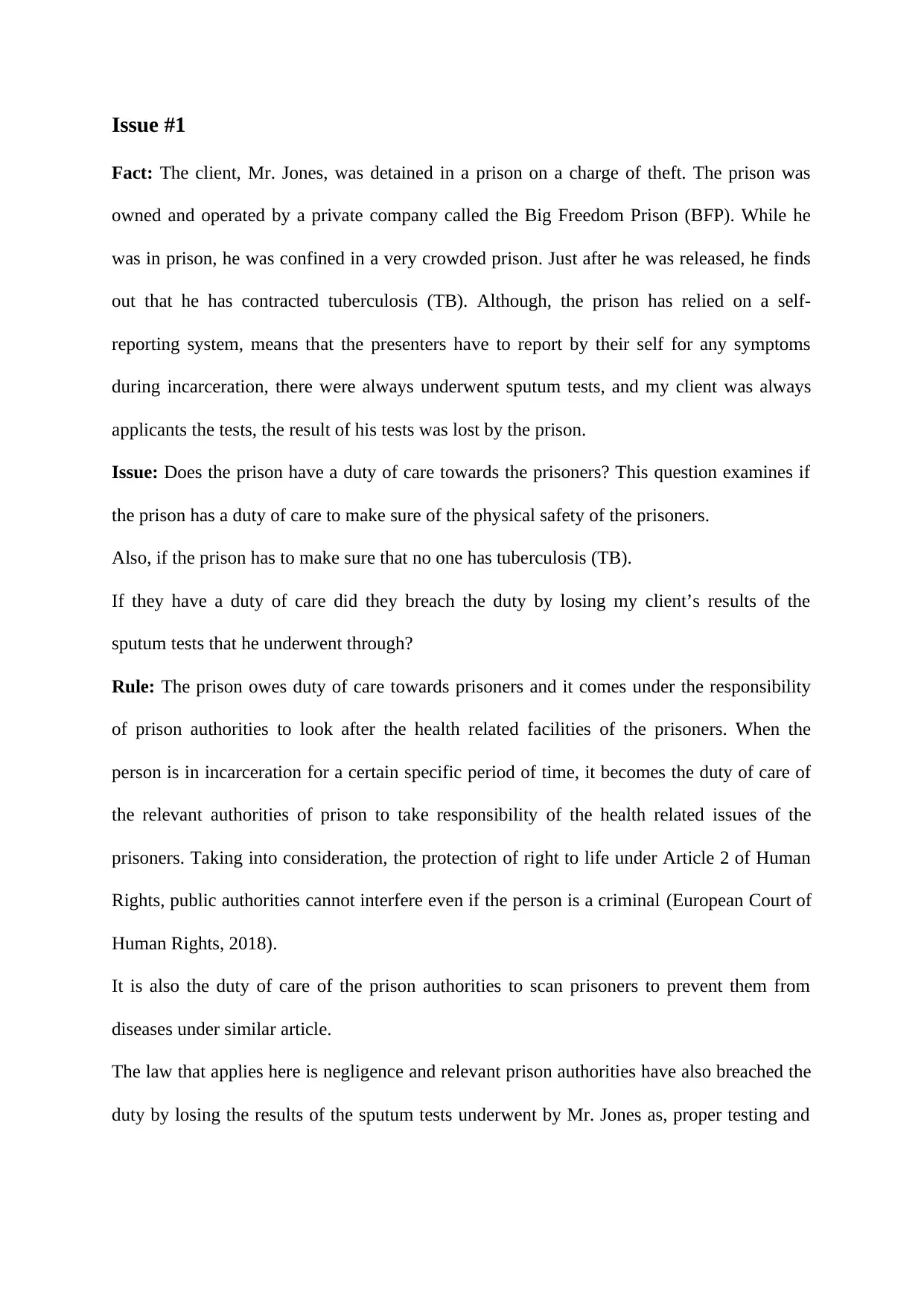
Issue #1
Fact: The client, Mr. Jones, was detained in a prison on a charge of theft. The prison was
owned and operated by a private company called the Big Freedom Prison (BFP). While he
was in prison, he was confined in a very crowded prison. Just after he was released, he finds
out that he has contracted tuberculosis (TB). Although, the prison has relied on a self-
reporting system, means that the presenters have to report by their self for any symptoms
during incarceration, there were always underwent sputum tests, and my client was always
applicants the tests, the result of his tests was lost by the prison.
Issue: Does the prison have a duty of care towards the prisoners? This question examines if
the prison has a duty of care to make sure of the physical safety of the prisoners.
Also, if the prison has to make sure that no one has tuberculosis (TB).
If they have a duty of care did they breach the duty by losing my client’s results of the
sputum tests that he underwent through?
Rule: The prison owes duty of care towards prisoners and it comes under the responsibility
of prison authorities to look after the health related facilities of the prisoners. When the
person is in incarceration for a certain specific period of time, it becomes the duty of care of
the relevant authorities of prison to take responsibility of the health related issues of the
prisoners. Taking into consideration, the protection of right to life under Article 2 of Human
Rights, public authorities cannot interfere even if the person is a criminal (European Court of
Human Rights, 2018).
It is also the duty of care of the prison authorities to scan prisoners to prevent them from
diseases under similar article.
The law that applies here is negligence and relevant prison authorities have also breached the
duty by losing the results of the sputum tests underwent by Mr. Jones as, proper testing and
Fact: The client, Mr. Jones, was detained in a prison on a charge of theft. The prison was
owned and operated by a private company called the Big Freedom Prison (BFP). While he
was in prison, he was confined in a very crowded prison. Just after he was released, he finds
out that he has contracted tuberculosis (TB). Although, the prison has relied on a self-
reporting system, means that the presenters have to report by their self for any symptoms
during incarceration, there were always underwent sputum tests, and my client was always
applicants the tests, the result of his tests was lost by the prison.
Issue: Does the prison have a duty of care towards the prisoners? This question examines if
the prison has a duty of care to make sure of the physical safety of the prisoners.
Also, if the prison has to make sure that no one has tuberculosis (TB).
If they have a duty of care did they breach the duty by losing my client’s results of the
sputum tests that he underwent through?
Rule: The prison owes duty of care towards prisoners and it comes under the responsibility
of prison authorities to look after the health related facilities of the prisoners. When the
person is in incarceration for a certain specific period of time, it becomes the duty of care of
the relevant authorities of prison to take responsibility of the health related issues of the
prisoners. Taking into consideration, the protection of right to life under Article 2 of Human
Rights, public authorities cannot interfere even if the person is a criminal (European Court of
Human Rights, 2018).
It is also the duty of care of the prison authorities to scan prisoners to prevent them from
diseases under similar article.
The law that applies here is negligence and relevant prison authorities have also breached the
duty by losing the results of the sputum tests underwent by Mr. Jones as, proper testing and
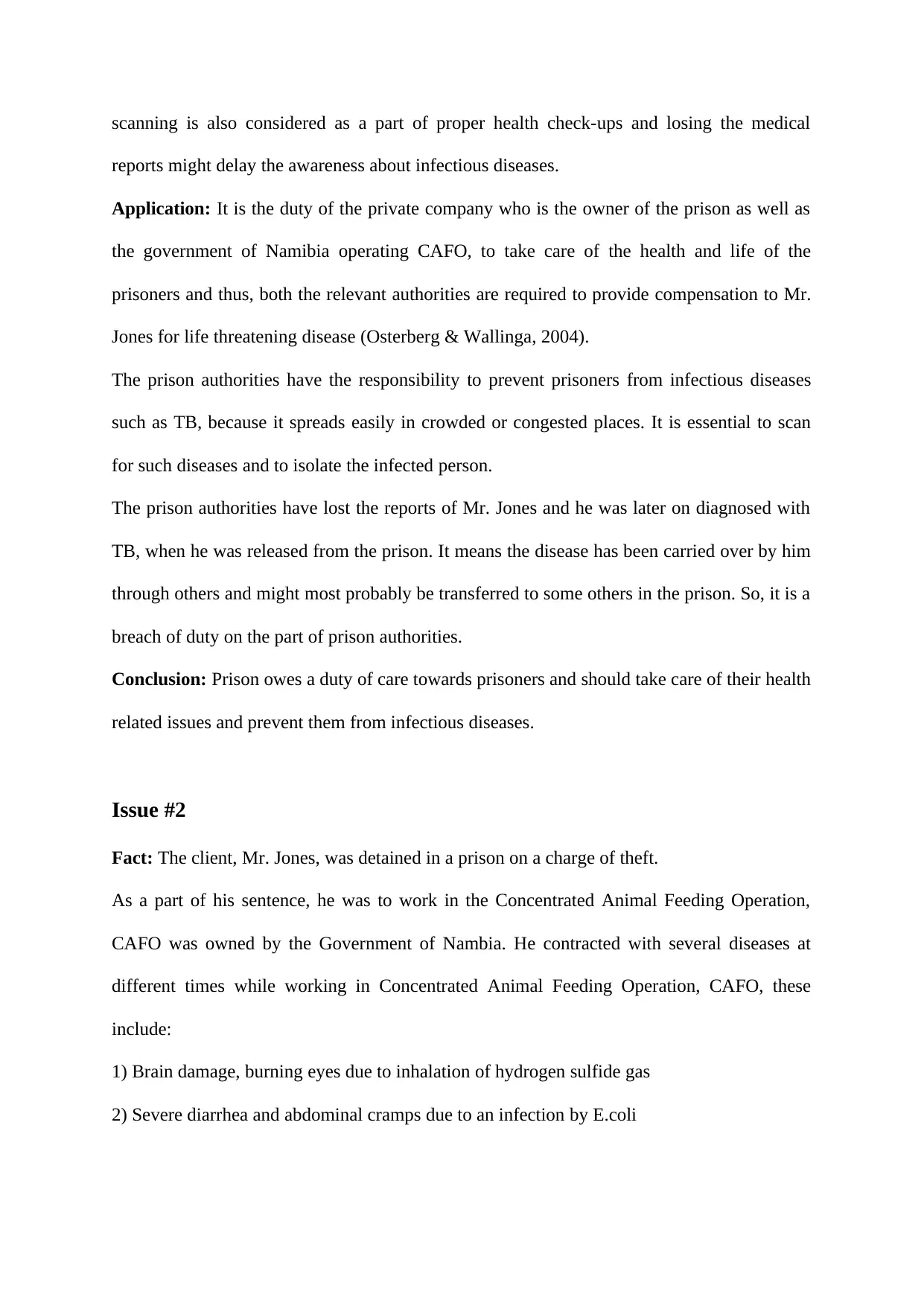
scanning is also considered as a part of proper health check-ups and losing the medical
reports might delay the awareness about infectious diseases.
Application: It is the duty of the private company who is the owner of the prison as well as
the government of Namibia operating CAFO, to take care of the health and life of the
prisoners and thus, both the relevant authorities are required to provide compensation to Mr.
Jones for life threatening disease (Osterberg & Wallinga, 2004).
The prison authorities have the responsibility to prevent prisoners from infectious diseases
such as TB, because it spreads easily in crowded or congested places. It is essential to scan
for such diseases and to isolate the infected person.
The prison authorities have lost the reports of Mr. Jones and he was later on diagnosed with
TB, when he was released from the prison. It means the disease has been carried over by him
through others and might most probably be transferred to some others in the prison. So, it is a
breach of duty on the part of prison authorities.
Conclusion: Prison owes a duty of care towards prisoners and should take care of their health
related issues and prevent them from infectious diseases.
Issue #2
Fact: The client, Mr. Jones, was detained in a prison on a charge of theft.
As a part of his sentence, he was to work in the Concentrated Animal Feeding Operation,
CAFO was owned by the Government of Nambia. He contracted with several diseases at
different times while working in Concentrated Animal Feeding Operation, CAFO, these
include:
1) Brain damage, burning eyes due to inhalation of hydrogen sulfide gas
2) Severe diarrhea and abdominal cramps due to an infection by E.coli
reports might delay the awareness about infectious diseases.
Application: It is the duty of the private company who is the owner of the prison as well as
the government of Namibia operating CAFO, to take care of the health and life of the
prisoners and thus, both the relevant authorities are required to provide compensation to Mr.
Jones for life threatening disease (Osterberg & Wallinga, 2004).
The prison authorities have the responsibility to prevent prisoners from infectious diseases
such as TB, because it spreads easily in crowded or congested places. It is essential to scan
for such diseases and to isolate the infected person.
The prison authorities have lost the reports of Mr. Jones and he was later on diagnosed with
TB, when he was released from the prison. It means the disease has been carried over by him
through others and might most probably be transferred to some others in the prison. So, it is a
breach of duty on the part of prison authorities.
Conclusion: Prison owes a duty of care towards prisoners and should take care of their health
related issues and prevent them from infectious diseases.
Issue #2
Fact: The client, Mr. Jones, was detained in a prison on a charge of theft.
As a part of his sentence, he was to work in the Concentrated Animal Feeding Operation,
CAFO was owned by the Government of Nambia. He contracted with several diseases at
different times while working in Concentrated Animal Feeding Operation, CAFO, these
include:
1) Brain damage, burning eyes due to inhalation of hydrogen sulfide gas
2) Severe diarrhea and abdominal cramps due to an infection by E.coli
Secure Best Marks with AI Grader
Need help grading? Try our AI Grader for instant feedback on your assignments.
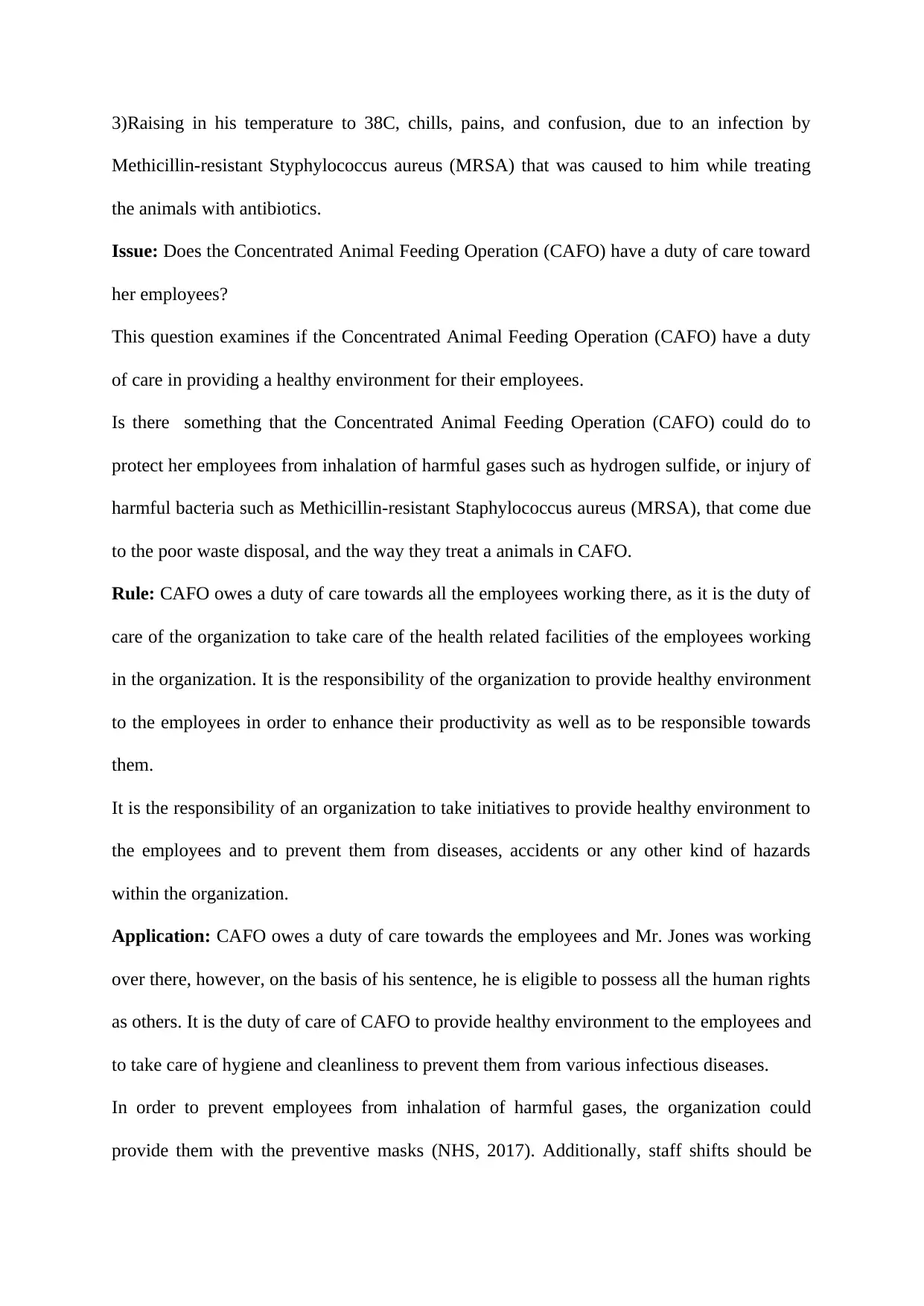
3)Raising in his temperature to 38C, chills, pains, and confusion, due to an infection by
Methicillin-resistant Styphylococcus aureus (MRSA) that was caused to him while treating
the animals with antibiotics.
Issue: Does the Concentrated Animal Feeding Operation (CAFO) have a duty of care toward
her employees?
This question examines if the Concentrated Animal Feeding Operation (CAFO) have a duty
of care in providing a healthy environment for their employees.
Is there something that the Concentrated Animal Feeding Operation (CAFO) could do to
protect her employees from inhalation of harmful gases such as hydrogen sulfide, or injury of
harmful bacteria such as Methicillin-resistant Staphylococcus aureus (MRSA), that come due
to the poor waste disposal, and the way they treat a animals in CAFO.
Rule: CAFO owes a duty of care towards all the employees working there, as it is the duty of
care of the organization to take care of the health related facilities of the employees working
in the organization. It is the responsibility of the organization to provide healthy environment
to the employees in order to enhance their productivity as well as to be responsible towards
them.
It is the responsibility of an organization to take initiatives to provide healthy environment to
the employees and to prevent them from diseases, accidents or any other kind of hazards
within the organization.
Application: CAFO owes a duty of care towards the employees and Mr. Jones was working
over there, however, on the basis of his sentence, he is eligible to possess all the human rights
as others. It is the duty of care of CAFO to provide healthy environment to the employees and
to take care of hygiene and cleanliness to prevent them from various infectious diseases.
In order to prevent employees from inhalation of harmful gases, the organization could
provide them with the preventive masks (NHS, 2017). Additionally, staff shifts should be
Methicillin-resistant Styphylococcus aureus (MRSA) that was caused to him while treating
the animals with antibiotics.
Issue: Does the Concentrated Animal Feeding Operation (CAFO) have a duty of care toward
her employees?
This question examines if the Concentrated Animal Feeding Operation (CAFO) have a duty
of care in providing a healthy environment for their employees.
Is there something that the Concentrated Animal Feeding Operation (CAFO) could do to
protect her employees from inhalation of harmful gases such as hydrogen sulfide, or injury of
harmful bacteria such as Methicillin-resistant Staphylococcus aureus (MRSA), that come due
to the poor waste disposal, and the way they treat a animals in CAFO.
Rule: CAFO owes a duty of care towards all the employees working there, as it is the duty of
care of the organization to take care of the health related facilities of the employees working
in the organization. It is the responsibility of the organization to provide healthy environment
to the employees in order to enhance their productivity as well as to be responsible towards
them.
It is the responsibility of an organization to take initiatives to provide healthy environment to
the employees and to prevent them from diseases, accidents or any other kind of hazards
within the organization.
Application: CAFO owes a duty of care towards the employees and Mr. Jones was working
over there, however, on the basis of his sentence, he is eligible to possess all the human rights
as others. It is the duty of care of CAFO to provide healthy environment to the employees and
to take care of hygiene and cleanliness to prevent them from various infectious diseases.
In order to prevent employees from inhalation of harmful gases, the organization could
provide them with the preventive masks (NHS, 2017). Additionally, staff shifts should be
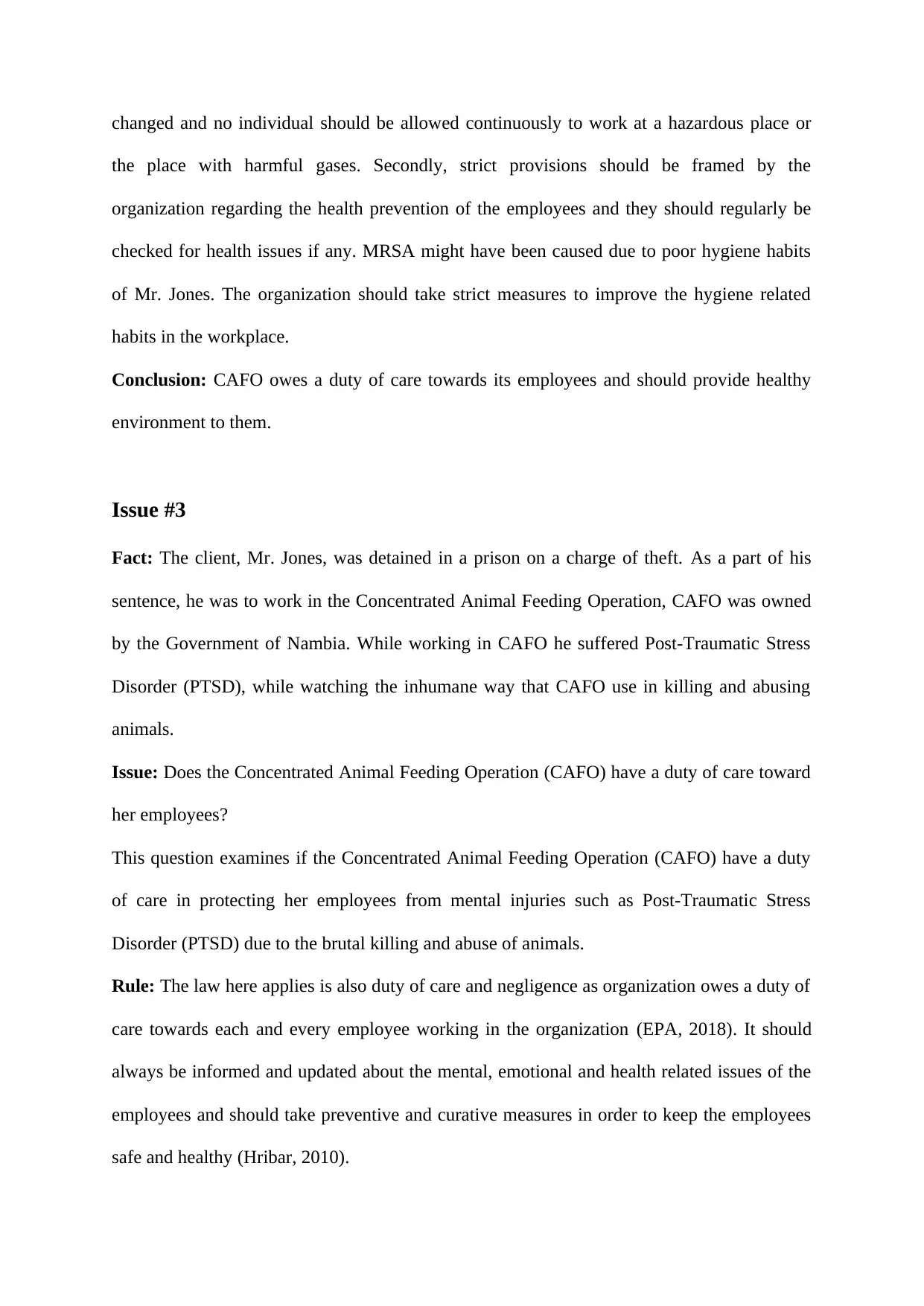
changed and no individual should be allowed continuously to work at a hazardous place or
the place with harmful gases. Secondly, strict provisions should be framed by the
organization regarding the health prevention of the employees and they should regularly be
checked for health issues if any. MRSA might have been caused due to poor hygiene habits
of Mr. Jones. The organization should take strict measures to improve the hygiene related
habits in the workplace.
Conclusion: CAFO owes a duty of care towards its employees and should provide healthy
environment to them.
Issue #3
Fact: The client, Mr. Jones, was detained in a prison on a charge of theft. As a part of his
sentence, he was to work in the Concentrated Animal Feeding Operation, CAFO was owned
by the Government of Nambia. While working in CAFO he suffered Post-Traumatic Stress
Disorder (PTSD), while watching the inhumane way that CAFO use in killing and abusing
animals.
Issue: Does the Concentrated Animal Feeding Operation (CAFO) have a duty of care toward
her employees?
This question examines if the Concentrated Animal Feeding Operation (CAFO) have a duty
of care in protecting her employees from mental injuries such as Post-Traumatic Stress
Disorder (PTSD) due to the brutal killing and abuse of animals.
Rule: The law here applies is also duty of care and negligence as organization owes a duty of
care towards each and every employee working in the organization (EPA, 2018). It should
always be informed and updated about the mental, emotional and health related issues of the
employees and should take preventive and curative measures in order to keep the employees
safe and healthy (Hribar, 2010).
the place with harmful gases. Secondly, strict provisions should be framed by the
organization regarding the health prevention of the employees and they should regularly be
checked for health issues if any. MRSA might have been caused due to poor hygiene habits
of Mr. Jones. The organization should take strict measures to improve the hygiene related
habits in the workplace.
Conclusion: CAFO owes a duty of care towards its employees and should provide healthy
environment to them.
Issue #3
Fact: The client, Mr. Jones, was detained in a prison on a charge of theft. As a part of his
sentence, he was to work in the Concentrated Animal Feeding Operation, CAFO was owned
by the Government of Nambia. While working in CAFO he suffered Post-Traumatic Stress
Disorder (PTSD), while watching the inhumane way that CAFO use in killing and abusing
animals.
Issue: Does the Concentrated Animal Feeding Operation (CAFO) have a duty of care toward
her employees?
This question examines if the Concentrated Animal Feeding Operation (CAFO) have a duty
of care in protecting her employees from mental injuries such as Post-Traumatic Stress
Disorder (PTSD) due to the brutal killing and abuse of animals.
Rule: The law here applies is also duty of care and negligence as organization owes a duty of
care towards each and every employee working in the organization (EPA, 2018). It should
always be informed and updated about the mental, emotional and health related issues of the
employees and should take preventive and curative measures in order to keep the employees
safe and healthy (Hribar, 2010).
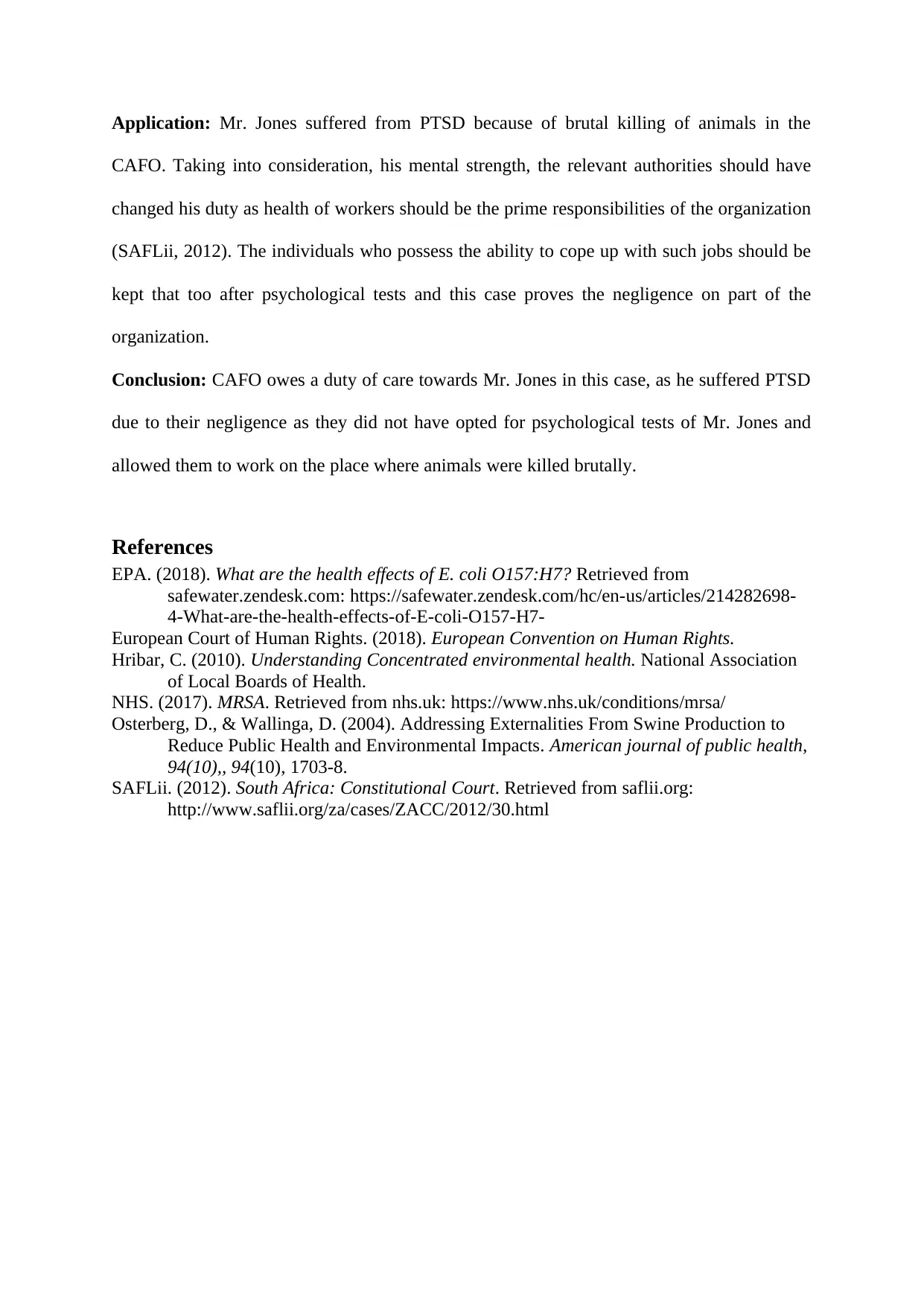
Application: Mr. Jones suffered from PTSD because of brutal killing of animals in the
CAFO. Taking into consideration, his mental strength, the relevant authorities should have
changed his duty as health of workers should be the prime responsibilities of the organization
(SAFLii, 2012). The individuals who possess the ability to cope up with such jobs should be
kept that too after psychological tests and this case proves the negligence on part of the
organization.
Conclusion: CAFO owes a duty of care towards Mr. Jones in this case, as he suffered PTSD
due to their negligence as they did not have opted for psychological tests of Mr. Jones and
allowed them to work on the place where animals were killed brutally.
References
EPA. (2018). What are the health effects of E. coli O157:H7? Retrieved from
safewater.zendesk.com: https://safewater.zendesk.com/hc/en-us/articles/214282698-
4-What-are-the-health-effects-of-E-coli-O157-H7-
European Court of Human Rights. (2018). European Convention on Human Rights.
Hribar, C. (2010). Understanding Concentrated environmental health. National Association
of Local Boards of Health.
NHS. (2017). MRSA. Retrieved from nhs.uk: https://www.nhs.uk/conditions/mrsa/
Osterberg, D., & Wallinga, D. (2004). Addressing Externalities From Swine Production to
Reduce Public Health and Environmental Impacts. American journal of public health,
94(10),, 94(10), 1703-8.
SAFLii. (2012). South Africa: Constitutional Court. Retrieved from saflii.org:
http://www.saflii.org/za/cases/ZACC/2012/30.html
CAFO. Taking into consideration, his mental strength, the relevant authorities should have
changed his duty as health of workers should be the prime responsibilities of the organization
(SAFLii, 2012). The individuals who possess the ability to cope up with such jobs should be
kept that too after psychological tests and this case proves the negligence on part of the
organization.
Conclusion: CAFO owes a duty of care towards Mr. Jones in this case, as he suffered PTSD
due to their negligence as they did not have opted for psychological tests of Mr. Jones and
allowed them to work on the place where animals were killed brutally.
References
EPA. (2018). What are the health effects of E. coli O157:H7? Retrieved from
safewater.zendesk.com: https://safewater.zendesk.com/hc/en-us/articles/214282698-
4-What-are-the-health-effects-of-E-coli-O157-H7-
European Court of Human Rights. (2018). European Convention on Human Rights.
Hribar, C. (2010). Understanding Concentrated environmental health. National Association
of Local Boards of Health.
NHS. (2017). MRSA. Retrieved from nhs.uk: https://www.nhs.uk/conditions/mrsa/
Osterberg, D., & Wallinga, D. (2004). Addressing Externalities From Swine Production to
Reduce Public Health and Environmental Impacts. American journal of public health,
94(10),, 94(10), 1703-8.
SAFLii. (2012). South Africa: Constitutional Court. Retrieved from saflii.org:
http://www.saflii.org/za/cases/ZACC/2012/30.html
1 out of 7
Your All-in-One AI-Powered Toolkit for Academic Success.
+13062052269
info@desklib.com
Available 24*7 on WhatsApp / Email
![[object Object]](/_next/static/media/star-bottom.7253800d.svg)
Unlock your academic potential
© 2024 | Zucol Services PVT LTD | All rights reserved.